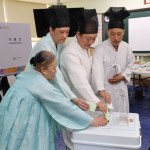Initial exit polls suggested South Korea’s liberal opposition parties are expected to win a landslide victory in yesterday’s parliamentary election.
The joint exit polls by South Korea’s three major TV stations – KBS, MBC and SBS – show the main opposition Democratic Party and its satellite party were forecast to win combined 183-197 seats in the 300-member National Assembly.
The polls suggested the ruling People Power Party and its satellite party were projected to win 85-100 seats.
The predictions, if confirmed, would deal a massive blow to conservative President Yoon Suk Yeol and make him a lame duck for his remaining three years in office.
In the months ahead of the election, the conservatives supporting Yoon and their liberal rivals exchanged toxic rhetoric and mudslinging. Regardless of the results, Yoon will stay in power, but if his People Power Party fails to regain a parliamentary majority it could set back Yoon’s agenda and further intensify conservative-liberal fighting.
Since taking office in 2022 for a single five-year term, Yoon, a former top prosecutor, has been grappling with low approval ratings and a liberal opposition-controlled parliament that has limited his major policy platforms.
Pre-election surveys indicate that the liberal opposition parties are well placed to maintain or boost their control of the single-chamber, 300-member National Assembly. But observers said that there’s room for an upset as many districts were being closely fought and many moderate voters would make last-minute choices.
“What would matter to the People Power Party is whether it can become the biggest party or the second biggest party,” said Choi Jin, director of the Seoul-based Institute of Presidential Leadership. “If his party loses the election, Yoon will find it difficult to move forward even a single step on state affairs.”
Of the 300 seats, 254 will be elected through direct votes in local districts, and the other 46 to the parties according to their proportion of the vote. Election observers say candidates in about 50 to 55 local districts are in neck-and-neck races.
Polling stations opened at 6 a.m. and will close at 6 p.m. As of 2 p.m. (0500 GMT), about 25 million people, or 56% of South Korea’s 44 million eligible voters, had cast ballots, according to the National Election Commission. That figure includes about 14 million people who cast ballots during two days of early voting last week, the highest turnout of its kind in the history of South Korean parliamentary elections.
South Korea’s conservative-liberal division deepened during the 2022 presidential election, during which Yoon and his main rival Lee Jae-myung spent months demonizing each other. Yoon eventually beat Lee by the narrowest margin ever for a Korean presidential candidate.
Lee, now the chairman of the opposition Democratic Party, is a harsh critic of Yoon’s policies and is eying another presidential bid. He faces an array of corruption investigations that he argues are politically motivated and pushed by by Yoon’s government.
There was a brief soul-searching about South Korea’s divisive politics after Lee was stabbed in the neck in January by a man who, according to police, tried to kill Lee to prevent him from becoming president. But as the parliamentary election approached, the rival parties began churning out abusive rhetoric and crude insults against each other.
Ruling party leader Han Dong-hoon called Lee “a criminal” and labeled his past comments as “trash.” Lee’s party spokesperson described Han’s mouth as a “trash bin.” Han accused Lee of using a sexist remark against a female ruling party candidate.
During one of his final campaign events on Tuesday, Han argued that giving too many seats to Lee’s Democratic Party will throw South Korea into political turmoil. “Tomorrow’s 12 hours will determine whether the Republic of Korea will plunge into shocking chaos and despair or overcome a crisis,” Han said, using South Korea’s official name.
Speaking ahead of his corruption trial at a Seoul court, Lee urged voters to punish the Yoon government, which he said has used prosecutors to suppress opponents. “I earnestly ask you to hand out your judgement on a government that betrays and goes against the people,” Lee said.
Chung Jin-young, a former dean of the Graduate School of Pan-Pacific International Studies at Kyung Hee University, predicted that the opposition parties could win a combined 150-180 seats.
“That would cause a political deadlock for the Republic of Korea for the next three years, as both the ruling and opposition parties can’t pursue things unilaterally and won’t likely make terms with each other,” Chung said. HYUNG-JIN KIM, SEOUL,
































